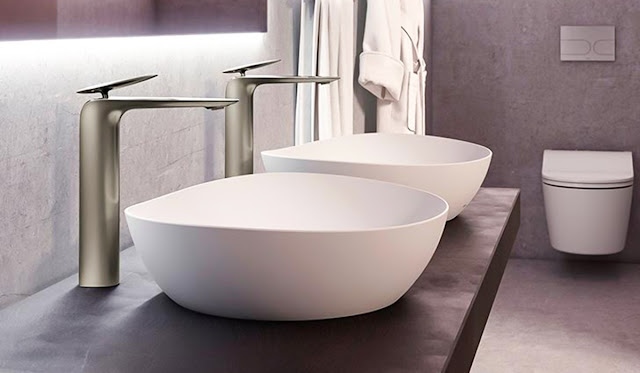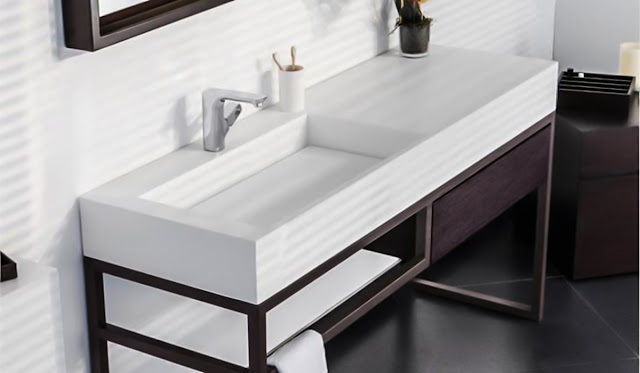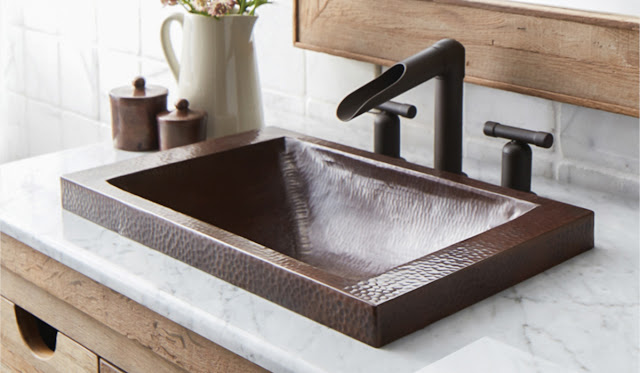Cleaning the bathroom sink is as simple as tossing some powdered cleanser or spraying some all-purpose cleaner and give it a scrub, right? Think again. Cleaning the sink may seem straightforward, but there are any number of things you can do to ruin your sink just by making some simple cleaning mistakes.
It all comes down to what your sink is made of. Here’s how to make sure your sink gets clean without any damage.
What is your sink made of?
Before you start thinking about cleaning, determine the material of your sink. Ceramic and porcelain are common materials for the bathroom sink but you also might run into acrylic, cast iron, quartz, glass, or even wood. Each require different care and maintenance.
Ceramic, Porcelain, Fireclay
All of similar composition, ceramic, porcelain, and Fireclay bathroom sinks should be cleaned with non-abrasive cleansers and soft cloths. Avoid acidic cleansers. There is a level of porosity to these materials, so it’s important to clean up stains quickly before they sink in. Daily maintenance is the best way to keep your ceramic, porcelain, or Fireclay sink looking its best.
For tough stains, line your sink with paper towels then spray the towels down with hydrogen peroxide. Let sit for a minimum of 30 minutes then remove towels and rinse. Oxygen bleach is another good option for tough stains.
Acrylic
Acrylic bathroom sinks are a fan favorite for their nonporous nature. They don’t stain easily and are resistant to mold and mildew. They can be cleaned with warm water and dish soap. For tougher stains, fill the sink with warm water and add a splash of bleach and let sit for up to 5 minutes. Any stains that don’t come out, simply give them a rub with the water and bleach solution.
Stone, Composite Stone & Engineered Stone
Both stone, composite, and engineered stone are all considered natural products. They are easy to maintain when given the daily care and protection they need.
Clean with mild detergent and warm water using a soft cloth. Rinse and thoroughly dry after cleaning. Keep acidic cleaners and makeup off the stone sink and clean up spills quickly.
Metal
Much like stone, metal sinks like copper, brass, or stainless steel can be cleaned regularly with warm water, mild detergent, and a soft cloth. Scrubbing or abrasive cleansers should be avoided as they can scratch the metal.
If oxidation occurs on your brass or copper sink, make a mixture of salt and vinegar or lemon juice then rub it on the sink, let sit for 10 minutes then rinse clean. This will restore a lot of the shine and color of the sink.
Glass
Glass sinks, as you might know from the glass in your shower, are best cleaned directly after use. Warm water and simple soap or detergent with a soft cloth will do the trick. Vinegar is also an excellent glass cleaner. Avoid abrasive cleansers. Rinse and dry thoroughly and buff out any water spots since they will be visible from the outside as well as the inside of the sink.
Wood
Wood sinks should be cleaned daily after use with a simple wipe down with a towel. Clean them regularly with mild soap and soft cloth. Avoid abrasive cleaners. You may want to refinish your wood sink occasionally or treat with a wood conditioner to keep the wood looking its best.
Enameled Cast Iron
Enameled cast iron sinks have been around for a long time and there many preferred ways to clean them. Simple non-abrasive cleaners and implements are best with mild detergents or cleaners. Some opt use bleach to restore an enameled cast iron sink to its full glory.
Vinegar is another time-tested cleaner for the sink. Many swear by Bar Keeper’s Friend cleanser to keep enameled sinks at their best. Others invest in enamel cleaning creams. Drying the sink out after each use is a great way to keep the sink cleaner and looking great!
Need to clean other items in the bathroom? Check out the best ways to clean the shower.











